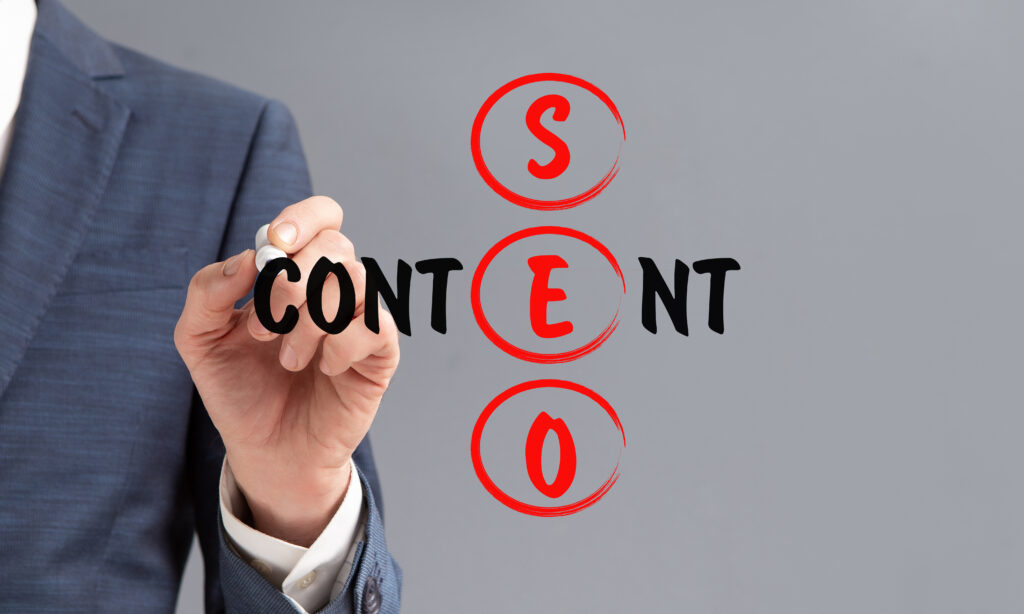
How to Leverage Content to Boost Your Law Firm’s SEO

In today’s advancing digital world, I’ve seen how essential high-quality content is for SEO success. As a law firm, you need a strong online presence to attract potential clients—but knowing where to start with SEO may feel overwhelming. In this blog, I will break down why content is the foundation of effective SEO, and how it can help your firm rank higher, attract clients, and build trust online.
Content and SEO: A Dynamic Duo
Think of SEO and content as two sides of the same coin. Search engines like Google are constantly trying to match users with the best answers to their questions, whether they’re looking for legal advice, practice area expertise, or insight into complex cases. For law firms, that means creating content that serves these needs.
I often emphasize that search engines prioritize sites with useful, relevant information that satisfies user intent. So, to rank higher, our content needs to answer clients’ questions and provide real value. Google’s algorithms may be complex, but they favor content that’s engaging and valuable to users.
How Content Drives SEO Performance
Understanding how search engines work helps tremendously. When Google crawls the web, it’s looking for websites that not only contain the right keywords, but also offer depth, accuracy, and relevance. High-quality content signals that our site is a trustworthy source.
And let’s face it—Google updates its algorithms frequently to prioritize what it sees as helpful content. This can feel frustrating, but it’s actually an advantage for law firms committed to quality. If we provide meaningful content, it doesn’t just boost rankings, it builds trust with potential clients.
Why Quality Content Matters for Your Law Firm
For law firms, quality content isn’t just about SEO. It’s about creating a powerful connection with potential clients. From my experience, here’s why content quality matters so much:
- User Satisfaction: Relevant, informative content keeps people on our site longer, and shows we understand their needs. If someone finds value in what we’ve written, they’re more likely to explore our services.
- Ranking and Visibility: Search engines prioritize websites that deliver a satisfying user experience. Pages with thorough, specific information on legal topics are more likely to perform well in search results.
- Conversions: Ultimately, our goal is to turn visitors into clients. Engaging content builds credibility and moves potential clients toward contacting us for their legal needs.
Examples of Content That Works for SEO in the Legal Industry
Content isn’t a one-size-fits-all solution, especially for law firms. Here are some types of content I recommend based on what’s worked well for legal clients:
- Blog Posts: Blogs are a great way to answer common questions and position ourselves as a trusted resource. Writing about changes in laws or recent case studies can attract clients who are searching for that information.
- Practice Area Pages: Detailed pages for each practice area help clarify what we do and build our credibility. Optimized pages that explain our expertise show potential clients why they should choose us.
- Client Guides: In-depth guides on topics like “Steps to Filing a Personal Injury Claim” give readers valuable insights while setting us apart as helpful and knowledgeable.
User Behavior and SEO: The Role of Content
Content is the heart of SEO, but user behavior also plays a big role. When I look at metrics like time on page and bounce rate, it’s clear that quality content drives engagement. Here’s how content influences these behaviors:
- Engagement: People who find our content helpful are likely to stay longer, explore related pages, and reach out to us.
- Building Trust: Accurate, in-depth information helps us come across as reliable. When users trust our content, they’re more likely to view us as a credible source.
- Conversions: Content isn’t just about getting visitors to our site—it’s about moving them to action. Calls-to-action (CTAs) and accessible contact forms can turn readers into clients.
Types of Content to Consider
While text remains the foundation of SEO content, multimedia elements such as videos, infographics, and images can enhance engagement and provide additional context. Here’s how to incorporate different types of content effectively:
- Text-Based Content: Written content remains essential for SEO. Search engines rely heavily on text to understand your site’s relevance to specific queries, so clear and concise legal content is crucial.
- Visual Content: Videos and images can capture attention and explain complex legal concepts more engagingly. Video summaries of legal processes or FAQ videos can attract clients who prefer visual information.
- Interactive Content: Interactive quizzes (e.g., “Do You Have a Case?”) can provide a unique user experience and improve engagement rates.
Key Takeaways:
For law firms, content is not only about SEO—it’s about creating a positive, informative user experience that attracts potential clients and builds trust. By focusing on producing high-quality, relevant content, your firm can enhance its online presence, improve search engine rankings, and ultimately attract more clients.
In a world where users rely heavily on search engines to find legal services, making your content valuable, accurate, and accessible is key to standing out in search results. Need help crafting compelling content that converts and boosts visibility? Contact us today to get started.
Are you ready to get started generating new, qualified leads?
Contact us to get started and let us help you energize your digital marketing and business development efforts.
Contact Us
